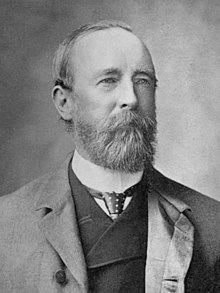
Back ألان هيوم Arabic الان هيوم ARZ Allan Oktavian Hum Azerbaijani ए. ओ. ह्यूम Bihari অ্যালান অক্টোভিয়ান হিউম Bengali/Bangla Allan Octavian Hume Breton Allan Octavian Hume Czech Allan Octavian Hume German Allan Octavian Hume Esperanto Allan Octavian Hume Spanish
Allan Octavian Hume | |
|---|---|
 Allan Octavian Hume (1829–1912) (scanned from a Woodburytype) | |
| Founder of Indian National Congress | |
| In office 1885–1887 | |
| Personal details | |
| Born | 4 June 1829 London, England |
| Died | 31 July 1912 (aged 83) London, England |
| Spouse |
Mary Anne Grindall (m. 1853) |
| Children | Maria Jane "Minnie" Burnley |
| Parent(s) | Joseph Hume (father) Maria Burnley (mother) |
| Relatives | Mary Hume-Rothery (sister) |
| Alma mater | University College Hospital East India Company College |
| Occupation |
|
| Known for | Founding of Indian National Congress Father of Indian Ornithology Founding the South London Botanical Institute |
| Signature | |
Allan Octavian Hume, CB ICS (4 June 1829[1] – 31 July 1912[2]) was a British political reformer, ornithologist, civil servant and botanist who worked in British India and was the founding spirit and key founder of the Indian National Congress. He was a proponent of Indian self-rule and strongly supported the idea of Indian independence. He supported the idea of self-governance by Indians.[3] A notable ornithologist, Hume has been called "the Father of Indian Ornithology" and, by those who found him dogmatic, "the Pope of Indian Ornithology".[4]
As an administrator of Etawah, he saw the Indian Rebellion of 1857 as a result of misgovernance and made great efforts to improve the lives of the common people. The district of Etawah was among the first to be returned to normalcy and over the next few years Hume's reforms led to the district being considered a model of development. Hume rose in the ranks of the Indian Civil Service but like his father Joseph Hume, a radical member of parliament, he was bold and outspoken in questioning British policies in India. He rose in 1871 to the position of secretary to the Department of Revenue, Agriculture, and Commerce under Lord Mayo who was assassinated a year later. He did not get along as well with subsequent viceroys, and his criticism of Lord Lytton's policies led to his removal from the Secretariat in 1879.
He founded the journal Stray Feathers in which he and his subscribers recorded notes on birds from across India. He built up a vast collection of bird specimens at his home in Shimla by making collection expeditions and obtaining specimens through his network of correspondents.
Following the loss of manuscripts that he had long worked on in the hope of producing a magnum opus on the birds of India, he abandoned ornithology and gifted his collection to the Natural History Museum in London, where it continues to be the single largest collection of Indian bird skins. He was briefly a follower of the theosophical movement founded by Madame Blavatsky. He worked for Indian self-governance through the Indian National Congress that he founded. He left India in 1894 to live in London from where he continued to take an interest in the Indian National Congress. He maintained an interest in English botany and founded the South London Botanical Institute towards the end of his life.
- ^ Cite error: The named reference
birdingasia2012was invoked but never defined (see the help page). - ^ Cite error: The named reference
DNBwas invoked but never defined (see the help page). - ^ Kataria, Kanta (2013). "A.O. Hume: His life and contribution to the regeneration of India". The Indian Journal of Political Science. 74 (2): 245–252. JSTOR 24701107.
- ^ Ali, S. (1979). Bird study in India: Its history and its importance. Azad Memorial lecture for 1978. Indian Council for Cultural Relations. New Delhi.